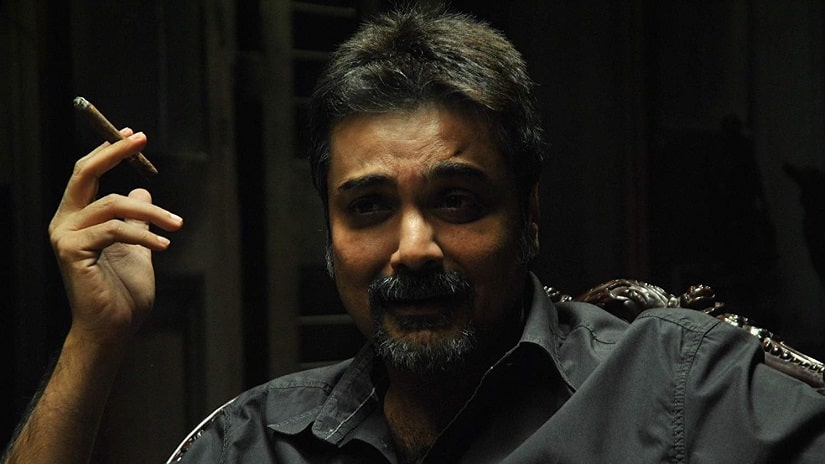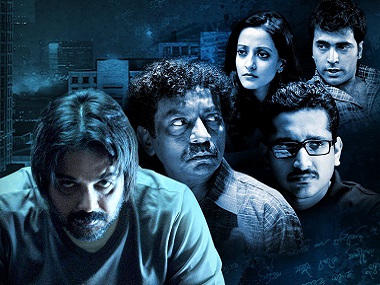‘ Killing Time ’ is a fortnightly column on murder mysteries from around the world. *** A good murder mystery is never about the thrill of its resolution. In fact, that part is regularly disappointing. A satisfying detective story is always about the poetry of pursuit. And Baishe Srabon takes this quite literally, to delightful effect. Inspired perhaps by the De Niro-Pacino buddy cop film Righteous Kill, Srijit Mukherji’s Baishe Srabon (2011) investigates a serial killer, who gruesomely murders marginalised Kolkatans in the dead of night and leaves a poem in his wake. Abhijit Pakrashi, a young police officer assigned to the case is unable to make any progress. He is forced to take the help of Prabir Roy Chowdhary, a discredited cop with a violent past. Together, they find closure to the crimes. What is exciting about Baishe Srabon is not the mystery itself. Like Prabir concedes at one point, it could appear like the “script of a naive Bengali thriller”. In spite of it, I believe that the film is an important contribution to the genre — and a must watch — simply because it’s an indulgent meditation on contemporary society. Some of the observations might appear frivolous or a nagging idiosyncrasy in passing — like the time Abhijit is upset that people are celebrating India’s World Cup victory while there is a murderer on the prowl. But it is mostly fabulous — the angst and helplessness of a Hungry generation poet in 2011 Kolkata. But we’ll come to that. [caption id=“attachment_8348651” align=“alignnone” width=“825”]  Still from Baishe Srabon[/caption] Take the pairing of Abhijit and Prabir, for now. Abhijit is a naive young cop. So naive that there is a scene where he flashes his police badge and smiles sheepishly, when caught fooling around with his lover on an unused staircase. He is subservient, respectful, we never once see him lay a hand on another person. Abhijit represents the goodness in the 2011 police force — fair but failing. Prabir, on the other hand, is a veteran cop who has no trouble breaking a few bones to extract a confession. “He took every criminal as his personal enemy,” someone says about him. In his misconduct hearing, his lawyer frantically claims temporary insanity to get him off serious punishment. In a sense, Prabir isn’t ’temporarily insane’ but ‘partly insane’. There is a part of him that is longing for brutal violence, after a point this even stops being righteous. He represents old-world policing — brilliant, but oppressive. The friction between these two extremes, and their masculinities, is fundamental to how we understand Baishe Srabon. How much you can empathise with a violent police officer will be directly proportional to the melancholy you feel at the end of film. The ending is so beautifully open to interpretation that it is as much about who you are as about what the film is implying. And the journey isn’t a straight line either. In fact, it’s more like a triangle, the other end held both firmly and gently by Nibaron Chakraborty, a transgressive poet from the Hungryalist movement, played with heart-warming empathy by Gautham Ghosh. Nibaron represents the society’s disregard for language, poetry, art, politics and also the weakest among us. He wanders the streets late into the night, sitting on railway platforms, reciting poems for strangers. At one point, he laments that publishers have rejected his poems: “Predictable, they say. What the hell! Is it a detective story or poetic prose?” The delightful irony of such dialogue is not to be lost. Nor should we skip past poetry in the interest of catching the killer, because in 2020, this could take on a whole new meaning. Obscene poetry and sedition six poets were taken away in chains aided by leading intellectuals. From behind the veil Victorian morality smirked at this spectacle as Macaulay’s bastard children danced unabashed on the stage set by the hangman. Fifty years have passed since blowing the bugle of the largest democracy, the reds, yellows, saffron and greens scream and gurgle for the plebeians. As the fangs clash merrily paper tigers appear making nooses out of red tape. And in the land of red earth Queen Draupadi sings and toils the whole day long. In their own ways, every character in the film has nostalgic scorn for modern Bengali life. Abhijit obsesses about the mixing of English and Hindi into Bengali. “It’s not ‘faltu’, it’s ‘phaltu’, there is no fa in Bengali,” he insists with profound irritation. Prabir repeatedly mocks the lack of intelligence of the present-day police force — “Donation, reference or simply cheating” he accuses are the only ways anyone one gets into the police force “these days”. But in this argument, both Abhijit and Prabir are on the same side, and Nibaron alone on the other side. This can be seen in complete dramatic glory when Prabir questions Nibaron. The scene is not just a clash of equal actors, but of complex ideas around the purpose of poetry and politics. I’d loathe to quote from this scene and take away from the impact of the conversation. It’s worth watching a few times over, if only to gauge yourselves: How much of a revolutionary are you? How much of a systems-believer? How much of a nihilist or how much of a nutter? None of this is to say that the film is flawless. Far from it. Abhijit has a love-story with Amrita, which I’d argue is grossly disagreeable. There is also a love triangle with a Surya, who has an “only mon, no hormone” relationship with Amrita — an interesting theme, but has no place in this film. The structure and beats in the script make the film predictable. For a thriller, it’s hardly racy or even thrilling. The worst of all is that it has a sequel that released earlier this year that almost upends the value system so beautifully balanced in Baishe Srabon. In short, what I love about Baishe Srabon is that it is an idealist’s reality — where the right and the wrong eventually get unclouded. One reason you should absolutely watch this film: Dialogue. Listen carefully and there is so much to think about. Where to watch: Disney Plus Hotstar Ranjani Krishnakumar is a writer, obsessor and a nascent Chennai-vasi. You can reach her at @_tharkuri
Inspired perhaps by the De Niro-Pacino buddy cop film Righteous Kill, Srijit Mukherji’s Baishe Srabon (2011) investigates a serial killer, who gruesomely murders marginalised Kolkatans in the dead of night and leaves a poem in his wake.
Advertisement
End of Article


)
)
)
)
)
)
)
)
)



